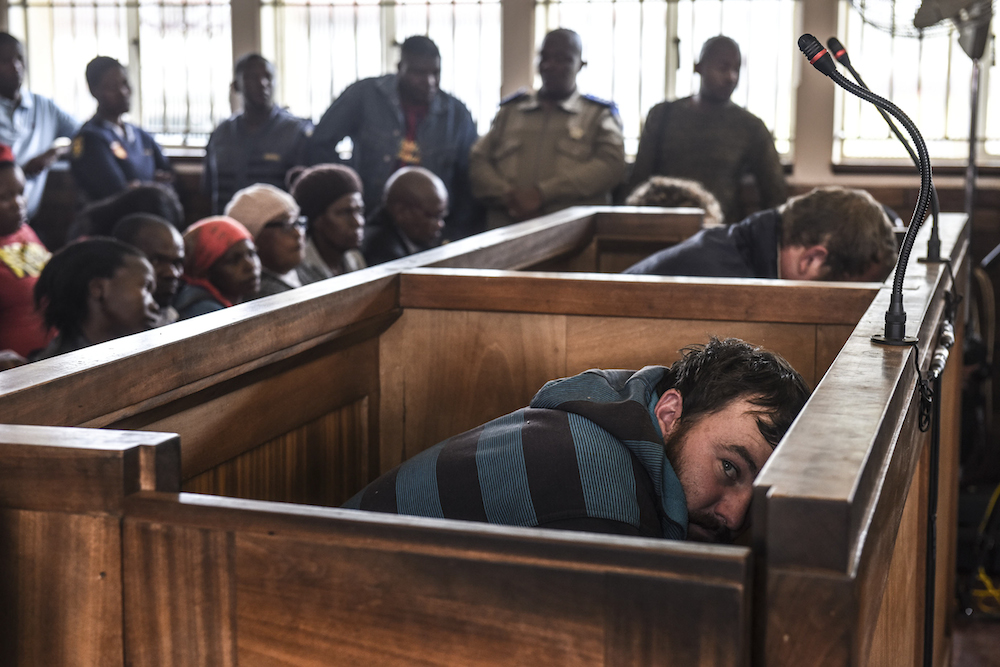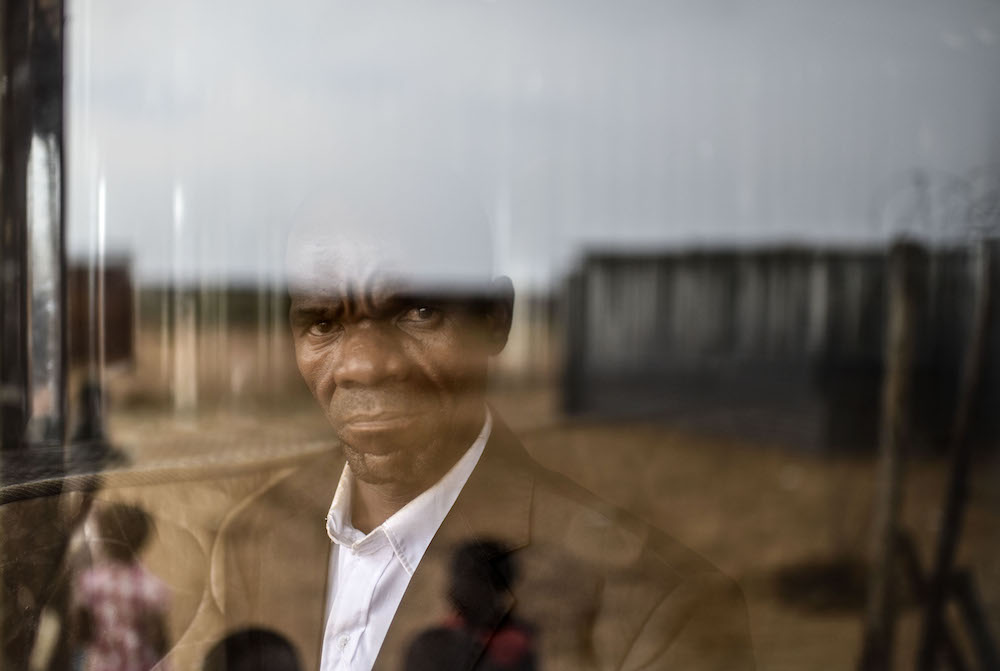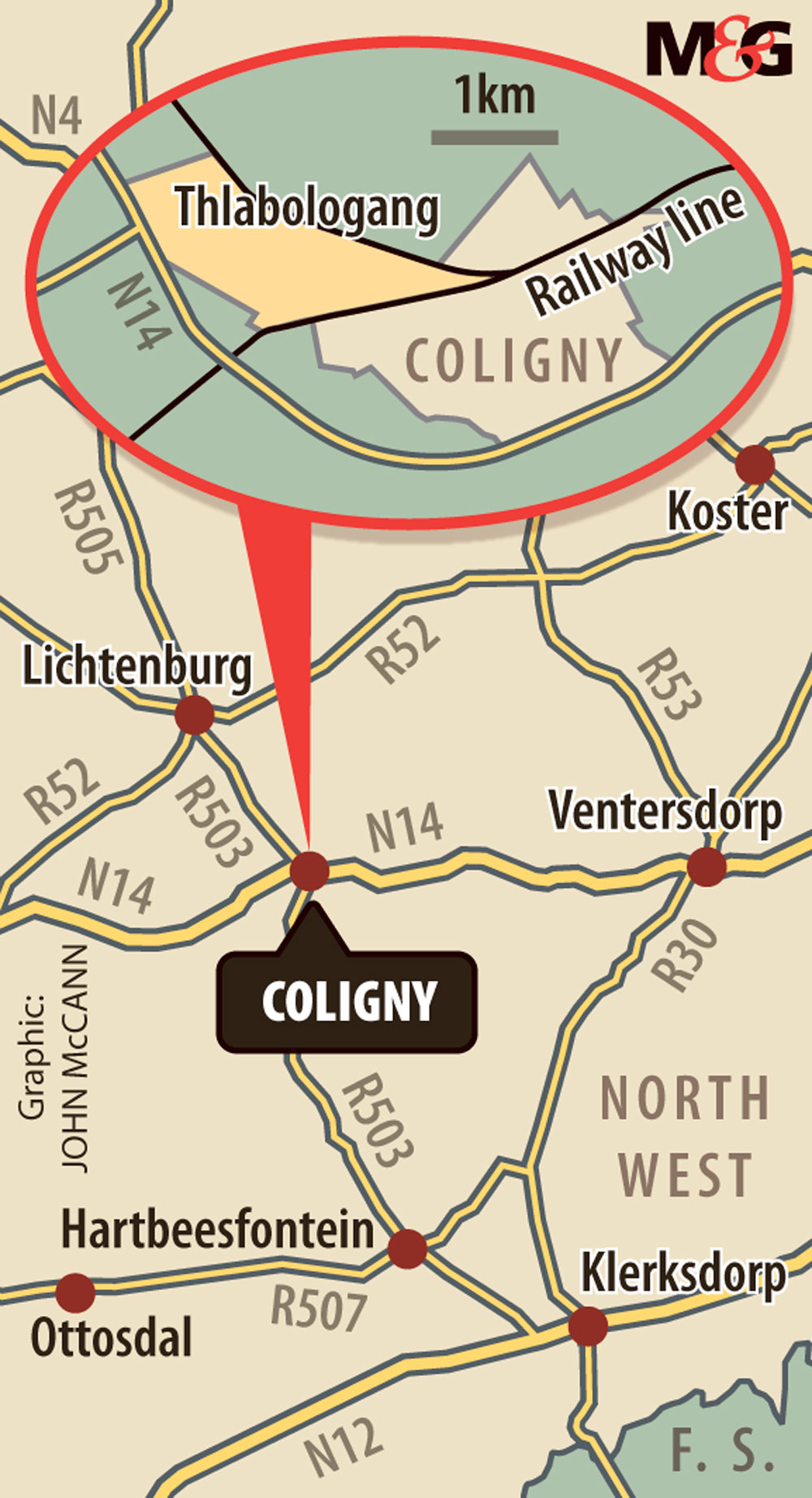Mourners at Matlhomola Moshoeu’s funeral hold aloft sunflower stalks in symbolic remembrance of how the teen died.
Matlhomola Moshoeu was born on a sunflower farm in Coligny 16 years ago. Two weeks ago, he died on a sunflower farm after stealing one for its seeds. Sunflower seeds mean big money for farmers but are also nourishment for Coligny’s poorest residents.
Matlhomola’s death ignited a race protest in the small North West town and has further divided its black and white communities.
This week, three farmhouses were torched after Phillip Schutte and Pieter Doorewaard, accused of murdering Matlhomola, were each released on R5 000 bail.

Phillip Schutte and Pieter Doorewaard are accused of the murder, and their release on bail has angered the community. (Paul Botes, M&G)
Coligny residents had earlier taken to the streets after the teenager’s death last week. Shops were burned and looted.
Matlhomola is alleged to have been killed by the two men, who caught him and a friend stealing sunflowers on a farm belonging to Doorewaard’s uncle, Pieter Karsten. The farm is just across a dust road from the cluster of shacks where the teenager lived.
Prosecutors pursuing a charge of murder against the pair accused them of throwing Matlhomola off a moving bakkie and beating and intimidating the only witness who came forward to implicate them in the death.
But Doorewaard and Schutte insist the 16-year-old died after jumping from the bakkie when they slowed down to turn a corner while taking him to the police station. In court, police confirmed that, over the past six months, the pair had brought in a number of children for the same offence.
Matlhomola had left the Scotland section of the Tlhabologang township at the beginning of the school holidays and was presumed to have been staying with his friends on one of the neighbouring farms, as he usually did, said family friend and community activist Stanley Mnyakama this week.
“He usually visits his friends on the farm during holidays. He was born there and his parents actually thought he was still there, when actually he had died,” he said.
Days after the teenager’s death his identity was still not known. Mnyakama, as a community leader, was tasked with visiting each of the farms surrounding the Scotland section to find out who his parents were.
As the days passed, the teen’s death increasingly angered people in the area who have “grown tired of the racist farmers”, he explained.
During the holidays, children in the area are known to play on the farms and, without any recreational facilities, they often land in trouble with farm owners over the theft of sunflowers and maize.
During term time, with better education being available in the neighbouring town of Lichtenburg, most learners walk 20km to and from school every day when the buses aren’t running.
Cutting through the farms to save time and eating the sunflower seeds and maize along the way had therefore become common practice, according to Tlhabologang resident Aaron Matshidiso.
“It’s a long walk to the schools, so you just pass through the farms and eat some mealies and these seeds because we don’t have food. But you can be sure that, if the farmer sees you taking a shortcut, his dogs will chase you down and, if he catches you, you’re getting klapped,” says Matshidiso.
“They get mad because when you plough, they scatter some seeds and the ones that are left, his cows or chickens eat it. So he would rather let the animals eat it than us.”
Matshidiso (26) says he worked as a farm labourer for five weeks. When his index finger had to be amputated after an accident while ploughing the fields, he was exposed to the anger of his “white master”.
“The top part of my finger was cut off by the machine. The farmer just shrugged and told me I’d better take myself to the hospital and not come back to work. I did open a case and reported it to the department of labour, but nothing happened to him,” he says, adding that he was not surprised that someone had allegedly been killed over a simple sunflower theft.
This kind of treatment has been going on for generations. At Matlhomola’s funeral, his uncle, Joe Mosweu, recalled how he had been chased down by dogs and beaten in the late 1970s.
“It happened to us a lot. Living here, you know it’s going to happen; it’s obvious. We used to steal mealies to take home and they would send the dogs, or catch us and beat us very badly. I was beaten very badly on these same farms,” Mosweu said.
North West Premier Supra Mahumapelo has repeated the view that Doorewaard and Schutte’s actions were racially motivated, asking how they would have responded if the person caught stealing sunflowers was white.
“Kids make mistakes, man. Why couldn’t they have just taken the boy to the parents and told them what he did. That’s how you are supposed to treat the youth. If it was a white boy who did that, would they have responded in the same way?” the premier asked.
Members of rival political parties the ANC and the Economic Freedom Fighters were briefly united by their anger towards the white community, which local activists said was preparing to intimidate the black population and defend the two men accused of murder.
“When they were appearing in court for the first time, these boere were carrying guns. They came to show us they aren’t scared of us. In fact, they’ve united us as black people through their Afrikaner racism,” protest leader Thabo Matshila said.
The racism in the small town has become intolerable over the past six months, said residents of the Scotland section. The rage triggered by Matlhomola’s death was acknowledged when the Coligny magistrate’s court ruled on the accused’s bail applications on Monday.
Magistrate Makgaola Foso refused to begin his judgment without Matlhomola’s family being present, saying he hoped to give them a clear explanation of his reasons for granting bail.
The state’s case hinges on the account of a witness who claims to have seen the two men throwing Matlhomola off the bakkie and beating him badly, Foso said.
The witness also claims to have been taken to a nearby dam, forced to drink alcohol and beaten, and then visited the next day and threatened with death if he spoke up.
But Foso said the witness had not yet identified the men as the pair he saw assaulting a young boy and he had not yet identified Matlhomola as the teenager he saw being beaten. Because of this, the magistrate said, there is no direct link between Doorewaard and Schutte and the boy’s death.
“What if the witness does not identify the accused as the people he saw committing a crime? Or he does not identify the deceased as the person he saw being thrown off the bakkie?” Foso asked in his judgment.
Foso said the accused could afford R20 000 bail but he set the bail amount at R5 000 each, saying the pair had demonstrated every intention of attending their trial.
His decision to release them outraged Matlhomola’s relatives and others.
One family member stormed out of court and slammed the door behind her, and Matlhomola’s father protested loudly. “My son has passed on and these two are being released to go and work? What about my son?” Sakkie Dingake said in Setswana.

The teenager’s father, Sakkie Dingake. (Paul Botes, M&G)
But the two men deny the allegations of racism levelled against them. Local pastor Tewie Pieter, who has farmed in Coligny for 20 years, said an increase in maize and sunflower theft at Karsten’s farm and the construction of hundreds of shacks in the Scotland section are to blame for the recent racial tensions.
“I think that [farmers being racist] is an unfair allegation against us. We have huge respect in this town, as farmers,” Pieter said.
“For the past six months, there have been huge losses on that farm because of the neighbouring squatter camp. The fence was even stolen. We’ve reported it to police on numerous occasions and people still walk through the farm to get to the township. Nothing has been done and so we’ve stepped up security there.”
On Monday, farmers emerged from their homes brandishing firearms when Schutte and Doorewaard appeared in court for their bail application, and again after three homes were torched by angry protesters after the magistrate handed down his ruling.
Less than 30 minutes after the pair was granted bail, fires were lit at busy intersections and the home of Henk and Karen Keyser was burned to the ground in a targeted arson attack.
The town was on a knife-edge and police became the last line of defence between angry youngsters and the maize and sunflower crops on Karsten’s farm.
Clad in full riot gear, firing rubber bullets and stun grenades, public order police officers stationed themselves along the perimeter of the sunflower field where Matlhomola had died, trying to keep a growing crowd of protesters off the farm.
The police fired rubber bullets and advanced towards a railway line, the only barrier between the township houses and shacks and the farm. As some of the protesters retreated, others grabbed corrugated iron sheets and defended themselves against the bullets while hurling rocks at the police and moving towards the sunflower field.
In a confrontation that lasted from 2pm until sundown, the police managed to prevent a possible attack on Karsten’s home and his crops.
Asked to explain their anger, many of the protesting residents cited the “low” bail amount of R5 000, saying that Doorewaard and Schutte had been let off lightly “because they are white”.
Evicted from farms, workers live in squalor
 The Scotland section of Coligny’s Tlhabologang township sprang up just over a year ago, after Parliament passed legislation giving rights to farmworkers who have lived on farms for more than 20 years. The new laws are said to have triggered mass evictions by Coligny farmers. The settlement has two water tanks and five mobile toilets, serving a population that has grown to more than 5 000, local residents estimated.
The Scotland section of Coligny’s Tlhabologang township sprang up just over a year ago, after Parliament passed legislation giving rights to farmworkers who have lived on farms for more than 20 years. The new laws are said to have triggered mass evictions by Coligny farmers. The settlement has two water tanks and five mobile toilets, serving a population that has grown to more than 5 000, local residents estimated.
“There’s almost nothing here [in Scotland section] for us, man. Only dust and shacks and two taps. Things are bad and these farmers kicked us off the land and made things worse,” resident Eric Matlhatlhedi said.
With the sunflower field less than 100m from the shacks and with no fencing in place, walking over to the field to get food has become common practice among the residents.
But the field has also recently become a safe haven for criminals.
Just a day before Matlhomola Moshoeu died, a 10-year-old girl was raped in the field, the Mail & Guardian has learnt.
The girl was returning from school and took a shortcut through the field to get to the Scotland section, her relatives told the M&G in the two-room shack in the informal settlement where more than five of them live.
The rapist has not yet been arrested, despite a case being opened and the young girl catching a glimpse of her attacker.
Now, with Matlhomola’s death and heightened tensions in the community, the girl’s family fear letting their children out of the shack to play along the road next to the sunflower field.
“These sonneblomme [sunflowers] are a problem because the criminals are using the field now. It’s so near to the shacks and it’s really not safe for our kids. They can’t even play nearby.
“I eat the sonneblom as well, but it’s really a problem for us now,” Refilwe Moroke, a resident of the Scotland section, told the M&G this week.